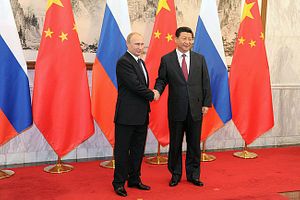This month, China and Russia signed a memorandum stipulating that the two countries would not conduct cyberattacks against each other and that they also would jointly thwart technology that could potentially “destabilize the internal political and socio-economic atmosphere,” “disturb public order” or “interfere with the internal affairs of the state,” the Wall Street Journal reported.
Additionally, Beijing and Moscow agreed on closer cooperation in combating cybercrime, and joint efforts to improve critical information infrastructure protection in both countries. According to one expert “perhaps 70 percent” of the language in the document has been directly taken from a previous agreement worked out under the auspices of the Shanghai Cooperation Organization.
For China, this is yet another step to promote its concept of Internet Sovereignty – a concept in direct opposition to the West’s idea of Internet freedom. Indeed, the Chinese Communist Party leadership sees the Western idea of Internet freedom as tantamount to Western “cyber-hegemony.”
As I have written here, Western cyber-hegemony is perceived to constitute a real danger to the stability of Chinese society and more importantly a threat to one-party rule in the People’s Republic. For China — despite high profile and much publicized international cyber-espionage cases — domestic considerations in cyberspace are paramount.
So, what to make of this agreement? This morning I had a quick conversation with Greg Austin, a fellow at the EastWest Institute and regular contributor to The Diplomat. Austin explained that the new agreement formalizes at a bilateral level an intensifying multilateral effort building off the proposal in the UN system for a code of conduct in cyberspace, submitted by both countries to the UN Secretary General back in January 2015 (Both countries first circulated an International Code of Conduct on Information Security already back in 2011).
“The agreement is a fulfillment of a decade of involvement by the two countries in cooperative measures on cyber space governance, including through the Shanghai Cooperation Organization talks beginning in 2006” Austin noted. “The agreement is more about that effort, and strengthening each other in the face of US cyber pre-eminence.”
Interestingly he pointed out that the agreement is not a commitment to refrain from all use of military cyber assets against each other:
Article 4 only commits the two countries not to undertake actions like “unlawful use or unsanctioned interference in the information resources of the other side, particularly through computer attack.” Article 4 says that each country has the right of self-defense in cyber space against “unlawful use or unsanctioned interference in the information resources of the other side, particularly through computer attack.”
Furthermore, Austin pointed out that neither Russia nor China regard cyber espionage or preparations for war in cyberspace as “unlawful” or “unsanctioned.” On the plus side he thinks that this bilateral memorandum may put some pressure on other states to follow suit in the diplomacy of cyberspace cooperation.
































